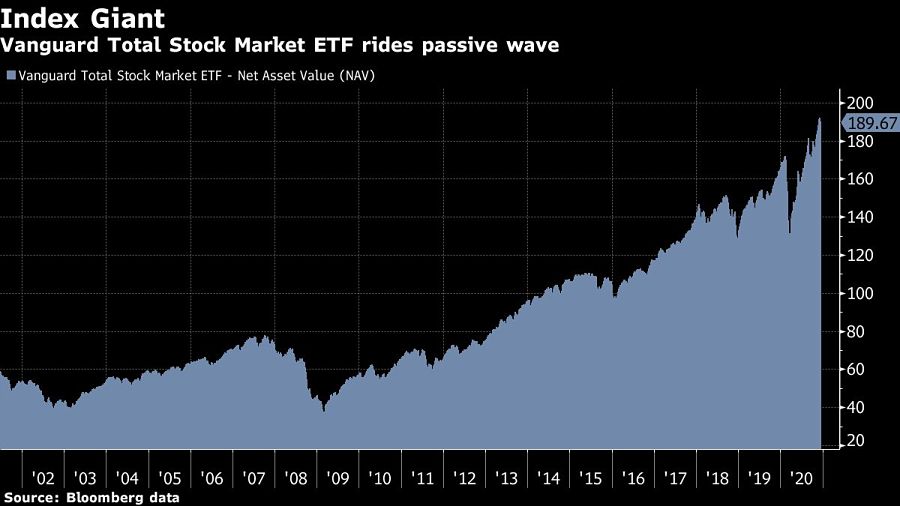

A Vanguard Group equity fund has become the first of its kind to eclipse $1 trillion of assets, a testament to the rise of index-based investing over the past three decades.
Vanguard Total Stock Market Index Fund, which includes both a mutual fund and an exchange-traded fund, had $1.04 trillion of assets as of Nov. 30, company data show.
“Given that Vanguard birthed index investing, it seems only fitting that one of their flagship funds would be the first to reach this historic mark,” said Nate Geraci, president of the ETF Store, an investment advisory firm.
While soaring U.S. stocks are fueling the fund, it’s also being bolstered by falling fees, a trend stoked by Vanguard, a pioneer in low-cost passive investing. The Vanguard Total Stock Market Index Fund was created in 1992, with the corresponding ETF following in 2001.

“Investors have become much more educated on the importance of fund fees and the serial underperformance of active management,” Geraci said. Those factors could further propel the fund for decades, he said.
Vanguard follows an unusual format, with its ETFs existing as a share class of its mutual funds. The Vanguard Total Stock Market ETF attracted the most cash of any ETF so far this year, with $30.8 billion of net inflows. Vanguard, the top issuer for ETF inflows this year, controls 28% of the $5.3 trillion U.S. ETF industry.

Elsewhere in Utah, Raymond James also welcomed another experienced advisor from D.A. Davidson.

A federal appeals court says UBS can’t force arbitration in a trustee lawsuit over alleged fiduciary breaches involving millions in charitable assets.

NorthRock Partners' second deal of 2025 expands its Bay Area presence with a planning practice for tech professionals, entrepreneurs, and business owners.

Rather than big projects and ambitious revamps, a few small but consequential tweaks could make all the difference while still leaving time for well-deserved days off.

Hadley, whose time at Goldman included working with newly appointed CEO Larry Restieri, will lead the firm's efforts at advisor engagement, growth initiatives, and practice management support.
Orion's Tom Wilson on delivering coordinated, high-touch service in a world where returns alone no longer set you apart.
Barely a decade old, registered index-linked annuities have quickly surged in popularity, thanks to their unique blend of protection and growth potential—an appealing option for investors looking to chart a steadier course through today's choppy market waters, says Myles Lambert, Brighthouse Financial.
